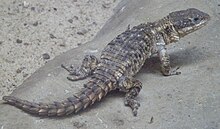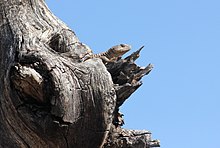| Limpopo girdled lizard | |
|---|---|

| |

| |
| Conservation status | |
 Least Concern (IUCN 3.1) | |
| Scientific classification | |
| Domain: | Eukaryota |
| Kingdom: | Animalia |
| Phylum: | Chordata |
| Class: | Reptilia |
| Order: | Squamata |
| Family: | Cordylidae |
| Genus: | Cordylus |
| Species: | C. jonesii |
| Binomial name | |
| Cordylus jonesii (Boulenger, 1891) | |
| Synonyms | |
The Limpopo girdled lizard (Cordylus jonesii), also known commonly as Jones's armadillo lizard and Jones's girdled lizard, is a species of lizard in the family Cordylidae. The species is indigenous to Southern Africa.
Etymology
The specific name, jonesii, is in honor of a "Mr. C. R. Jones" who collected the holotype. The common name, Limpopo girdled lizard, refers to the type locality, which is the Murchison Range in Limpopo.
Geographic range
C. jonesii is found on both sides of South Africa's border with Botswana, Zimbabwe, and Mozambique.
Habitat and behavior
The Limpopo girdled lizard is arboreal and inhabits dry forests, especially mopane woodland, where it hides under loose bark and in hollow tree limbs.
Diet
C. jonesii preys upon winged termites, ants, and moths.
Reproduction
C. jonesii is ovoviviparous. Litter size is usually two young, but may be as many as four.
Description
The dorsal pattern of C. jonesii varies from red to brown to gray, with dark spots or lines. On some individuals, the lines fuse into a black-bordered white stripe along the midline of the back. The Limpopo girdled lizard has a distinct dark dorsolateral stripe running from the head to the hips. The belly, throat, and lips are cream to yellow. The tail is very spiny and about 45% the total length of the animal. Adults usually have a snout-to-vent length (SVL) of 6.0–7.5 cm (2.4–3.0 in).
Taxonomy
The Limpopo girdled lizard is sometimes classified as a subspecies of the tropical girdled lizard (Cordylus tropidosternum). When both species are held together, the Limpopo girdled lizard has a noticeably shorter snout. In C. jonesii the nostril pierces the center of the nasal scale (the lower posterior corner of the nasal in C. tropidosternum). All of the ventral scales on the throat and belly of C. jonesii are smooth instead of keeled. C. jonesii is exported from Mozambique for the pet trade, where it is often mislabeled as Cordylus vittifer.
References
- ^ Alexander, G.J.; Tolley, K.A. (2021). "Cordylus jonesii ". IUCN Red List of Threatened Species. 2021: e.T110159440A139708864. Retrieved 18 November 2021.
- ^ Uetz, Peter; Hallermann, Jakob. "Cordylus jonesii (BOULENGER, 1891)". The Reptiles Database. Zoological Museum Hamburg. Retrieved 19 December 2018.
- Beolens, Bo; Watkins, Michael; Grayson, Michael (2011). The Eponym Dictionary of Reptiles. Baltimore: Johns Hopkins University Press. xiii + 296 pp. ISBN 978-1-4214-0135-5. (Cordylus jonesii, p. 136).
- ^ Branch (2004).
Further reading
- Boulenger GA (1891). "Description of a new Lizard of the Genus Zonurus from the Transvaal". Annals and Magazine of Natural History, Sixth Series 7: 417. (Zonurus jonesii, new species).
- Branch, Bill (2004). Field Guide to Snakes and other Reptiles of Southern Africa. Third Revised edition, Second impression. Sanibel Island, Florida: Ralph Curtis Books Publishing. 399 pp. ISBN 0-88359-042-5. (Cordylus tropidosternum jonesi, p. 195 + Plate 66).
- Broadley DG, Branch WR (2002). "A review of the small east African Cordylus (Sauria: Cordylidae), with the description of a new species". African Journal of Herpetology 51 (1): 9–34.
| Taxon identifiers | |
|---|---|
| Cordylus jonesii | |
This lizard article is a stub. You can help Misplaced Pages by expanding it. |